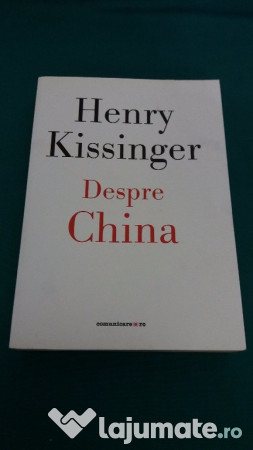Henry Kissinger Despre China Pdf
The rating – what does it mean?At getAbstract, we summarize books. that help people understand the world and make it better. Whatever we select for our library has to excel in one or the other of these two core criteria:Enlightening – You’ll learn things that will inform and improve your decisions.Helpful – You’ll take-away practical advice that will help you get better at what you do.We rate each piece of content on a scale of 1–10 with regard to these two core criteria. Our rating helps you sort the titles on your reading list from adequate (5) to brilliant (10). Books we rate below 5 won’t be summarized. Here's what the ratings mean:5 –Solid. A helpful and/or enlightening book, inspite of its obvious shortcomings.
For instance, it may be offer decent advice in some areas but be repetitive or unremarkable in others.6 – Notable. A helpful and/or enlightening book that stands out by at least one aspect, e.g. Is particularly well structured.7 – Good. A helpful and/or enlightening book that combines two or more noteworthy strengths, e.g. Contains uncommonly novel ideas and presents them in an engaging manner.8 – Very good.

A helpful and/or enlightening book that has a substantial number of outstanding qualities without excelling across the board, e.g. Presents the latest findings in a topical field and is written by a renowned expert but lacks a bit in style.9 – Superb. A helpful and/or enlightening book that is extremely well rounded, has many strengths and no shortcomings worth mentioning.10 – Brilliant. A helpful and/or enlightening book that, in addition to meeting the highest standards in all pertinent aspects, stands out even among the best. Often an instant classic and must-read for everyone.While the rating tells you how good a book is according to our two core criteria, it says nothing about its particular defining features. In his formidable 500-page-plus book, equally formidable scholar-diplomat Henry Kissinger writes about the nation with which he is inextricably linked: China.
Wwtbam lifelines. Kissinger infuses his text with impressive personal recollections based on more than 50 visits to China over 40 years, working either officially as national security adviser and secretary of state, or unofficially as a foreign policy expert. In that time, he has seen China’s evolution through four generations of its leaders. His insights on foreign policy and his personal rapport with top officials enable him to embellish this diplomatic history with extraordinary detail and discernment. GetAbstract highly recommends the book’s vast scope to anyone seriously interested in examining China’s current and future role in world politics and economics, and that should be just about everyone. The Center of the UniverseChina’s history as one of the world’s oldest civilizations continues to shape its thinking today.
Henry Kissinger Despre China Pdf Download

Henry Kissinger Despre China Pdf Free
Ancient records describe the unification of China in the third century BC, with the emperor at the center of a vast political hierarchy. But even Chinese mythology alludes to no true beginning to the society, simply an eternal existence as the center of the universe, or the “Middle Kingdom.” China’s current written language dates back to 2000 BC, linking contemporary Chinese citizens with their ancient literature and historical figures. This sense of continuity imbues the actions of modern Chinese leaders, who take a long-term view of the world and their role in it.To govern and unite its vast population, China adopted the philosophy of Confucius (551-479 BC), who stressed the “Way” of order, harmony and compassionate rule, along with a disdain for overt displays of power. Functionaries in China’s vast bureaucracy were experts in Confucian thought, which stressed learning, honesty and strength of character.For much of its history, China was wealthy, powerful and self-sufficient. As early as the 1400s, it had the world’s largest, most.
Most Popular Articles
- Prison Break Season 1 1080p Torrent
- Ryan Leslie Les Is More
- Antron 99 User Manual
- Jct Standard Building Contract With Quantities 2011
- Careless World Rise Of The Last King Zip Tyga
- Secret Service Oh Susie Rar
- Domus Planner Vista 3d
- Free Online Chota Bheem Cricket Games
- Modificacion Conducta Pdf
- Puzzle Kingdoms Pc
- Bully Ps2 Pc Highly Compressed
- Age Of Empires For Android Apk
- The Cipp Model For Evaluation Pdf
- Binatone B350 Updates
- How To Install Austrumi Linux